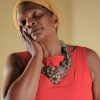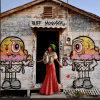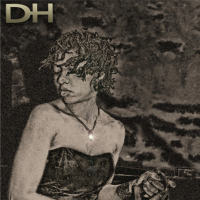Home » Jazz Musicians » Billie Holiday
Billie Holiday
Billie Holiday ("Lady Day") is considered by many to be the greatest of all jazz singers. In a tragically abbreviated singing career that lasted less than three decades, her evocative phrasing and poignant delivery profoundly influenced vocalists who followed her. Although her warm, feathery voice inhabited a limited range, she used it like an accomplished jazz instrumentalist, stretching and condensing phrases in an ever-shifting dialogue with accompanying musicians. Famous for delivering lyrics a bit behind the beat, she alternately endowed them with sadness, sensuality, languor, and irony. Rarely singing blues, Holiday performed mostly popular material, communicating deep emotion by stripping down rather than dressing up words and lines. "If you find a tune that's got something to do with you, you just feel it, and when you sing it, other people feel it, too," Holiday once explained. According to the Penguin Encyclopedia of Popular Music, "She was the first and is perhaps still the greatest of jazz singers, if the essence of jazz singing is to make the familiar sound fresh, and to make any lyric come alive with personal meaning for the listener."
Holiday's life was a study in hardship. Her parents married when she was three, but her musician father was seldom present and the couple soon divorced. Receiving little schooling as a child, Holiday scrubbed floors and ran errands for a nearby brothel so she could listen to idols Louis Armstrong and Bessie Smith on the Victrola in its parlor. Brutally raped at ten, she was sent to a reformatory for "seducing" her adult attacker; at fourteen she was jailed for prostitution. Determined to find work as a dancer or singer in Harlem, Holiday moved to New York City in 1928 and landed her first job at Jerry Preston's Log Cabin, where her vocals moved customers to tears. Discovered in another Harlem club by jazz record producer John Hammond in 1932, she made her first recording a year later with Benny Goodman's orchestra. She began to record regularly for Columbia, usually under the direction of Teddy Wilson, backed by small studio bands comprised of the day's best jazz sidemen. These included saxophonist and soulmate Lester Young, whose style approximated Holiday's own; it was he who gave the pretty, dignified young singer the nickname "Lady Day."
Intended largely for a black jukebox audience, the Wilson discs were quickly and cheaply made. But Holiday and company transformed them into jazz treasures, immediately appreciated by musicians, critics, and jazz afficianados, if not the public at large. These hundred-odd songs—delivered in a light, bouyant style—are today considered among Holiday's most significant work. Forgoing club engagements in l937 to tour with Count Basie's orchestra, Holiday went on to become one of the first black vocalists to be featured with a white band when she fronted for Artie Shaw a year later. Life on the road proved bitter for the singer, though; racial segregation made simple things like eating, sleeping, and going to the bathroom logistically difficult. Fed up when she could not enter one hotel through the front door with the rest of the Shaw orchestra, Holiday abandoned touring, returning to New York clubs and cabarets as a solo artist.
Read moreTags
Celebrating Billie Holiday, Carmen McRae Plus New Releases By Mafalda Minnozzi, Steve Knight, the Esthesis Quartet, Deb Bowman & More

by Mary Foster Conklin
This broadcast highlights Jazz Appreciation Month with new releases from Mafalda Minnozzi, Deb Bowman, Steve Knight and the Esthesis Quartet, with birthday shoutouts to Billie Holiday, Carmen McRae, Rosa Passos, Marilyn Maye and Herbie Hancock, among others. Happy listening and please support the artists you hear -see them live, buy their music so they can continue to comfort, distract, provoke and remind the world that A Woman's Place is in the Groove. Many thanks for tuning in. Playlist ...
Continue ReadingNew Releases, Birthday Celebrations For Dorothy Donegan, Alberta Hunter, Billie Holiday & More

by Mary Foster Conklin
This broadcast makes the graceful morph from Womens History to Jazz Appreciation Month with new releases from John Basile, Kandace Springs, Jamie Baum, Queen Esther, Leigh Pilzer, Lizz Wright and Tierney Sutton, with birthday shoutouts to Dorothy Donegan, Alberta Hunter, Billie Holiday, Doris Day, Christine Jensen, Tessa Souter, Teri Parker, Tia Fuller, and Amina Claudine Myers, among others. Thanks for listening and please support the artists you hear by seeing them live and online. Purchase their music so they can ...
Continue ReadingWhat A Little Moonlight Can Do

by Dan McClenaghan
The birthday bash for my granddaughter Marisol went down at my son's house, on the other side of town. And since her other abuelo was on the patio cooking chicken taquitos in a makeshift deep fryer, I'd offered to buy the pizzas. I phoned in the order: five pepperonis, extra cheese all around. They wouldn't take my credit card info. They said they'd been hacked, their customers pulled into financial danger, so they'd send in a drone with a card ...
Continue ReadingApril In My Heart: Celebrating Spring With Carmen McRae and Billie Holiday

by Mary Foster Conklin
Midway through Jazz Appreciation Month, this broadcast continues the Spring celebration with songs of April plus birthday shoutouts to Carmen McRae, Freddie Hubbard, Dorothy Donegan, Andre Previn, Marilyn Maye and Billie Holiday, among others. Thanks for listening and please support the artists you hear by purchasing their music during this time of lockdown. Playlist Dr. Lonnie Smith “Up Jumped Spring" from All In My Mind (Blue Note) 00:00 Suzanne Pittson “We're Having a Crisis (Crisis)" from Out of ...
Continue ReadingBillie

by Ian Patterson
Billie New Black Films 96 minutes 2020 A victim of her own self-destructive excesses is a common trope when assessing Billie Holiday. Yet James Erskine's handsome documentary Billie makes a convincing case for Holiday—arguably the greatest of all jazz singers—as more a victim of poverty, racism, manipulation and brutal misogyny. Holiday's story has been amply documented in the past and Erskine sketches the basic biographical details of her life with the aid ...
Continue ReadingBillie Holiday: la vita e la voce

by Emmanuel Di Tommaso
Billie Holiday: la vita e la voce Guido Santato 151 pagine ISBN: 978-88-290-0287-0 Carocci Editore 2020 Il principale merito di Guido Santato nel suo Billie Holiday: la vita e la voce, pubblicato da Carocci Editore, è la capacità di districarsi abilmente nella selva di materiale bibliografico e discografico prodotto nel corso degli anni da vari autrici e autori sulla figura della cantante originaria di Philadelphia. Incrociando innumerevoli testi autobiografici e biografici, articoli di ...
Continue ReadingI'll Remember April - Happy Jazz Appreciation Month!

by Mary Foster Conklin
A smooth segue from Women's History into Jazz Appreciation Month, commencing with a celebration of Gene Bertoncini, Freddie Hubbard and John Pizzarelli's birthdays in the first hour and concluding with a celebration of Billie Holiday in the final hour, plus new releases from Ashley Pezzotti, Ulysses Owens, Jr., Alicia Olatuja and Claire Martin & Jim Mullen and more birthday nods to Alberta Hunter, Doris Day and Andre Previn, among others. Playlist Tom Wolfe & Gene Bertoncini “I'll Remember ...
Continue ReadingDocumentary: Billie

Source:
JazzWax by Marc Myers
In the late 1960s, journalist Linda Lipnack Kuehl planned to write the definitive biography of Billie Holiday. Beginning in 1970, she spent eight years tracking down and recording interviews with key artists and personalities who knew the singer, who died in 1959. These interviews included conversations with Charles Mingus, Tony Bennett, Sylvia Syms, and Count Basie as well as Holiday's cousin, school friends, lovers, lawyers, pimps and even the FBI agents who arrested her. Kuehl's Holiday archives included interviews on ...
read more
Jazz Musician of the Day: Billie Holiday

Source:
Michael Ricci
All About Jazz is celebrating Billie Holiday's birthday today!
Billie Holiday ("Lady Day") is considered by many to be the greatest of all jazz singers. In a tragically abbreviated singing career that lasted less than three decades, her evocative phrasing and poignant delivery profoundly influenced vocalists who followed her. Although her warm, feathery voice inhabited a limited range, she used it like an accomplished jazz instrumentalist, stretching and condensing phrases in an ever-shifting dialogue with accompanying musicians. Famous for delivering ...
read more
Jazz Musician of the Day: Billie Holiday

Source:
Michael Ricci
All About Jazz is celebrating Billie Holiday's birthday today!
Billie Holiday ("Lady Day") is considered by many to be the greatest of all jazz singers. In a tragically abbreviated singing career that lasted less than three decades, her evocative phrasing and poignant delivery profoundly influenced vocalists who followed her. Although her warm, feathery voice inhabited a limited range, she used it like an accomplished jazz instrumentalist, stretching and condensing phrases in an ever-shifting dialogue with accompanying musicians. Famous for delivering ...
read more
Jazz Musician of the Day: Billie Holiday

Source:
Michael Ricci
All About Jazz is celebrating Billie Holiday's birthday today!
Billie Holiday ("Lady Day") is considered by many to be the greatest of all jazz singers. In a tragically abbreviated singing career that lasted less than three decades, her evocative phrasing and poignant delivery profoundly influenced vocalists who followed her. Although her warm, feathery voice inhabited a limited range, she used it like an accomplished jazz instrumentalist, stretching and condensing phrases in an ever-shifting dialogue with accompanying musicians. Famous for delivering ...
read more
Jazz Musician of the Day: Billie Holiday

Source:
Michael Ricci
All About Jazz is celebrating Billie Holiday's birthday today!
Billie Holiday ("Lady Day") is considered by many to be the greatest of all jazz singers. In a tragically abbreviated singing career that lasted less than three decades, her evocative phrasing and poignant delivery profoundly influenced vocalists who followed her. Although her warm, feathery voice inhabited a limited range, she used it like an accomplished jazz instrumentalist, stretching and condensing phrases in an ever-shifting dialogue with accompanying musicians. Famous for delivering ...
read more
Jazz Musician of the Day: Billie Holiday

Source:
Michael Ricci
All About Jazz is celebrating Billie Holiday's birthday today!
Billie Holiday ("Lady Day") is considered by many to be the greatest of all jazz singers. In a tragically abbreviated singing career that lasted less than three decades, her evocative phrasing and poignant delivery profoundly influenced vocalists who followed her. Although her warm, feathery voice inhabited a limited range, she used it like an accomplished jazz instrumentalist... Read more.
Place our Musician of the Day widget on your website or blog. ...
read more
Jazz Musician of the Day: Billie Holiday

Source:
Michael Ricci
All About Jazz is celebrating Billie Holiday's birthday today!
Billie Holiday ("Lady Day") is considered by many to be the greatest of all jazz singers. In a tragically abbreviated singing career that lasted less than three decades, her evocative phrasing and poignant delivery profoundly influenced vocalists who followed her. Although her warm, feathery voice inhabited a limited range, she used it like an accomplished jazz instrumentalist... Read more.
Place our Musician of the Day widget on your website or blog. ...
read more
Jazz Musician of the Day: Billie Holiday

Source:
Michael Ricci
All About Jazz is celebrating Billie Holiday's birthday today!
Billie Holiday ("Lady Day") is considered by many to be the greatest of all jazz singers. In a tragically abbreviated singing career that lasted less than three decades, her evocative phrasing and poignant delivery profoundly influenced vocalists who followed her. Although her warm, feathery voice inhabited a limited range, she used it like an accomplished jazz instrumentalist... Read more.
Place our Musician of the Day widget on your website or blog. ...
read more
Jazz Musician of the Day: Billie Holiday

Source:
Michael Ricci
All About Jazz is celebrating Billie Holiday's birthday today!
Billie Holiday ("Lady Day") is considered by many to be the greatest of all jazz singers. In a tragically abbreviated singing career that lasted less than three decades, her evocative phrasing and poignant delivery profoundly influenced vocalists who followed her. Although her warm, feathery voice inhabited a limited range, she used it like an accomplished jazz instrumentalist... Read more.
Place our Musician of the Day widget on your website or blog. ...
read more
Legacy Recordings Celebrates Billie Holiday's 100th Birthday

Source:
Michael Ricci
Legacy Recordings Celebrates Billie Holiday's 100th Birthday with Release of The Centennial Collection, 20 Essential Lady Day Recordings, on Tuesday, March 31, 2015. Newly Curated Anthology Brings Together 20 Career-Defining Performances, Originally Released from 1935-1945 New York, NY – Columbia Records/Legacy Recordings is celebrating the 100th birthday of Billie Holiday with the release of The Centennial Collection—a newly curated single disc anthology showcasing 20 of the incomparable American blues and jazz singer/composer's finest recordings. Billie Holiday: The Centennial Collection will ...
read more






















































































































































































